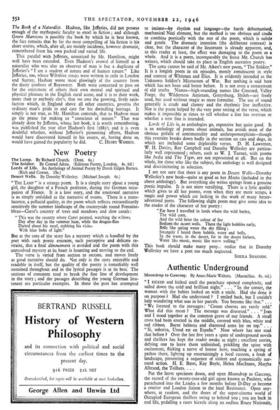New Poetry
The Lamp. By Richard Church. (Dent. 6s.) Desert Wells. By Dorothy Wellesley. (Michael Joseph. 6s.) " THE LAMP " is a strange poem. It is a simple story about a young girl, the daughter of a French professor, during the German occu- pation of France. It is a love story, and the emotional narrative is as simply unfolded as the narrative of events. There is a trans- lucence, a pellucid quality, in the poem which reflects extraordinarily sensitively the summer landscape of the countryside round Fontaine- bleau—Corot's country of trees and meadows and slow canals:
" This was the country where Corot painted, watching the willows Day after day in the summer haze, while the dragon-flies Darted about his easel, stabbing his vision With blue boles of light."
But at the core of the story lies a mystery which is handled by the poet with such poetic restraint, such perceptive and delicate re- straint, that a fmal denouement is avoided and the poem with this unresolved mystery at its heart is haunting and moving to the end. The verse is varied from section to section, and moves freely as good narrative should do. Not only is the story enjoyable and readable in itself, but the quality of the poetry is remarkably well sustained throughout and in the lyrical passages is at its best. The sections of comment tend to break the fine line of development in the story ; and the passages describing the young German lieu- tenant are particular examples. In these the poet has attempted
to imitate—by rhythm and language—the harsh dehumanised, mechanical Nazi element, but the method is too obvious and crude to combine poetically with the rest of the poem, which is subtle and gentle. The dramatic intention (the deliberate contrast) is clear, but the character of the lieutenant is already apparent, and, to this reader at least, the effect was damaging to the poem as a whole. And it is a poem, incomparably the finest Mr. Church has written, which should take its place in English narrative poetry.
The same cannot be said of Mr. Aiken's new poem, " The Soldier." It is a longish poem in six episodes, mostly reminiscent in style and content of Whitman and Eliot. It is evidently intended as the Unknown Soldier's Microcosm of War. But nothing is said here which has not been said better before. It is not even a restatement of old truths. Names—high-sounding names like Concord, Valley Forge, the Wilderness Antietam, Gettysburg, Shiloh—are freely used, but used without magic as mere formulae. The use of sound generally is crude and clumsy and the rhythmic line ineffective. Nor is the poem helped by the very poor setting of the verse, which makes it impossible at times to tell whether a line has overrun or whether a new line is intended.
Lords of Life is, as anthologies go, expensive but quite good. It is an anthology of poems about animals, but avoids most of the obvious pitfalls of sentimentality and anthropomorphism—though this restraint breaks down badly in the section on cats and dogs, in which are included some deplorable verses. D. H. Lawrence, W. H. Davies, Roy Campbell and Dorothy Wellesley are particu- larly well represented ; others, such as W. J. Turner, with poems like India and The Tiger, are not represented at all. But on the whole, for those who like the subject, the anthology is well designed and discriminating in selection.
I am not sure that there is any poem in Desert Wells—Dorothy Wellesley's new book—quite so good as her Moths (included in the above anthology). But everything she writes springs from a genuine poetic impulse. It is not mere versifying. There is a lyric quality which gives to all her poems, even when they are mere scraps, a magic and power which are lacking in the work of many better- advertised poets. The following slight poem may give some idea to the reader of the character of her poetry:
" Far have I travelled in lands where the wild barley, The wild corn, And the wild briar the colour of fire Bedizen the desert wells. There the light bubbles early, Bells like spring water the sky filling ; Strangely I heard them babble, water and bells, In the waste, in the desert, far in the desert forlorn, Water like music, music like water welling."
This book should make many peop,_ realise that in Dorothy Wellesley we have a poet too much neglected.
SHEILA SHANNON.


































 Previous page
Previous page